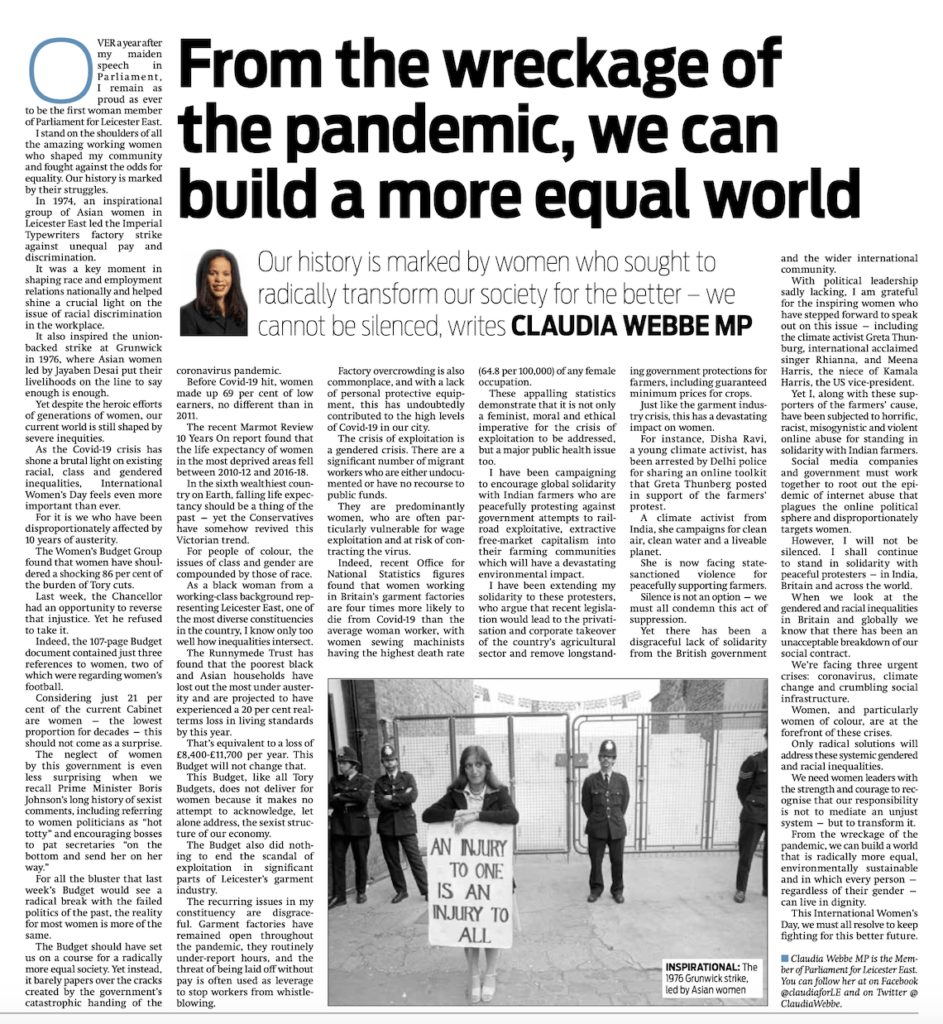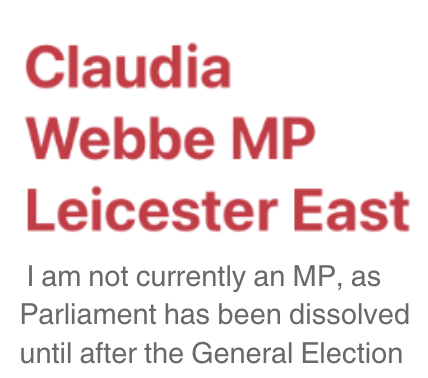
From the wreckage of the pandemic, we can build a more equal world
By Claudia Webbe MP
Our history is marked by women who sought to radically transform our society for the better – we cannot be silenced, writes CLAUDIA WEBBE MP
OVER a year after my maiden speech in Parliament, I remain as proud as ever to be the first woman member of Parliament for Leicester East.
I stand on the shoulders of all the amazing working women who shaped my community and fought against the odds for equality. Our history is marked by their struggles.
In 1974, an inspirational group of Asian women in Leicester East led the Imperial Typewriters factory strike against unequal pay and discrimination.
It was a key moment in shaping race and employment relations nationally and helped shine a crucial light on the issue of racial discrimination in the workplace.
It also inspired the union-backed strike at Grunwick in 1976, where Asian women led by Jayaben Desai put their livelihoods on the line to say enough is enough.
Yet despite the heroic efforts of generations of women, our current world is still shaped by severe inequities.
As the Covid-19 crisis has shone a brutal light on existing racial, class and gendered inequalities, International Women’s Day feels even more important than ever.
For it is we who have been disproportionately affected by 10 years of austerity.
The Women’s Budget Group found that women have shouldered a shocking 86 per cent of the burden of Tory cuts.
Last week, the Chancellor had an opportunity to reverse that injustice. Yet he refused to take it.
Indeed, the 107-page Budget document contained just three references to women, two of which were regarding women’s football.
Considering just 21 per cent of the current Cabinet are women — the lowest proportion for decades — this should not come as a surprise.
The neglect of women by this government is even less surprising when we recall Prime Minister Boris Johnson’s long history of sexist comments, including referring to women politicians as “hot totty” and encouraging bosses to pat secretaries “on the bottom and send her on her way.”
For all the bluster that last week’s Budget would see a radical break with the failed politics of the past, the reality for most women is more of the same.
The Budget should have set us on a course for a radically more equal society. Yet instead, it barely papers over the cracks created by the government’s catastrophic handing of the coronavirus pandemic.
Before Covid-19 hit, women made up 69 per cent of low earners, no different than in 2011.
The recent Marmot Review 10 Years On report found that the life expectancy of women in the most deprived areas fell between 2010-12 and 2016-18.
In the sixth wealthiest country on Earth, falling life expectancy should be a thing of the past — yet the Conservatives have somehow revived this Victorian trend.
For people of colour, the issues of class and gender are compounded by those of race.
As a black woman from a working-class background representing Leicester East, one of the most diverse constituencies in the country, I know only too well how inequalities intersect.
The Runnymede Trust has found that the poorest black and Asian households have lost out the most under austerity and are projected to have experienced a 20 per cent real-terms loss in living standards by this year.
That’s equivalent to a loss of £8,400-£11,700 per year. This Budget will not change that.
This Budget, like all Tory Budgets, does not deliver for women because it makes no attempt to acknowledge, let alone address, the sexist structure of our economy.
The Budget also did nothing to end the scandal of exploitation in significant parts of Leicester’s garment industry.
The recurring issues in my constituency are disgraceful. Garment factories have remained open throughout the pandemic, they routinely under-report hours, and the threat of being laid off without pay is often used as leverage to stop workers from whistleblowing.
Factory overcrowding is also commonplace, and with a lack of personal protective equipment, this has undoubtedly contributed to the high levels of Covid-19 in our city.
The crisis of exploitation is a gendered crisis. There are a significant number of migrant workers who are either undocumented or have no recourse to public funds.
They are predominantly women, who are often particularly vulnerable for wage exploitation and at risk of contracting the virus.
Indeed, recent Office for National Statistics figures found that women working in Britain’s garment factories are four times more likely to die from Covid-19 than the average woman worker, with women sewing machinists having the highest death rate (64.8 per 100,000) of any female occupation.
These appalling statistics demonstrate that it is not only a feminist, moral and ethical imperative for the crisis of exploitation to be addressed, but a major public health issue too.
I have been campaigning to encourage global solidarity with Indian farmers who are peacefully protesting against government attempts to railroad exploitative, extractive free-market capitalism into their farming communities which will have a devastating environmental impact.
I have been extending my solidarity to these protesters, who argue that recent legislation would lead to the privatisation and corporate takeover of the country’s agricultural sector and remove longstanding government protections for farmers, including guaranteed minimum prices for crops.
Just like the garment industry crisis, this has a devastating impact on women.
For instance, Disha Ravi, a young climate activist, has been arrested by Delhi police for sharing an online toolkit that Greta Thunberg posted in support of the farmers’ protest.
A climate activist from India, she campaigns for clean air, clean water and a liveable planet.
She is now facing state-sanctioned violence for peacefully supporting farmers.
Silence is not an option — we must all condemn this act of suppression.
Yet there has been a disgraceful lack of solidarity from the British government and the wider international community.
With political leadership sadly lacking, I am grateful for the inspiring women who have stepped forward to speak out on this issue — including the climate activist Greta Thunburg, international acclaimed singer Rhianna, and Meena Harris, the niece of Kamala Harris, the US vice-president.
Yet I, along with these supporters of the farmers’ cause, have been subjected to horrific, racist, misogynistic and violent online abuse for standing in solidarity with Indian farmers.
Social media companies and government must work together to root out the epidemic of internet abuse that plagues the online political sphere and disproportionately targets women.
However, I will not be silenced. I shall continue to stand in solidarity with peaceful protesters — in India, Britain and across the world.
When we look at the gendered and racial inequalities in Britain and globally we know that there has been an unacceptable breakdown of our social contract.
We’re facing three urgent crises: coronavirus, climate change and crumbling social infrastructure.
Women, and particularly women of colour, are at the forefront of these crises.
Only radical solutions will address these systemic gendered and racial inequalities.
We need women leaders with the strength and courage to recognise that our responsibility is not to mediate an unjust system — but to transform it.
From the wreckage of the pandemic, we can build a world that is radically more equal, environmentally sustainable and in which every person — regardless of their gender — can live in dignity.
This International Women’s Day, we must all resolve to keep fighting for this better future.
Claudia Webbe MP is the member of Parliament for Leicester East. You can follow her at www.facebook.com/claudiaforLE and twitter.com/ClaudiaWebbe


